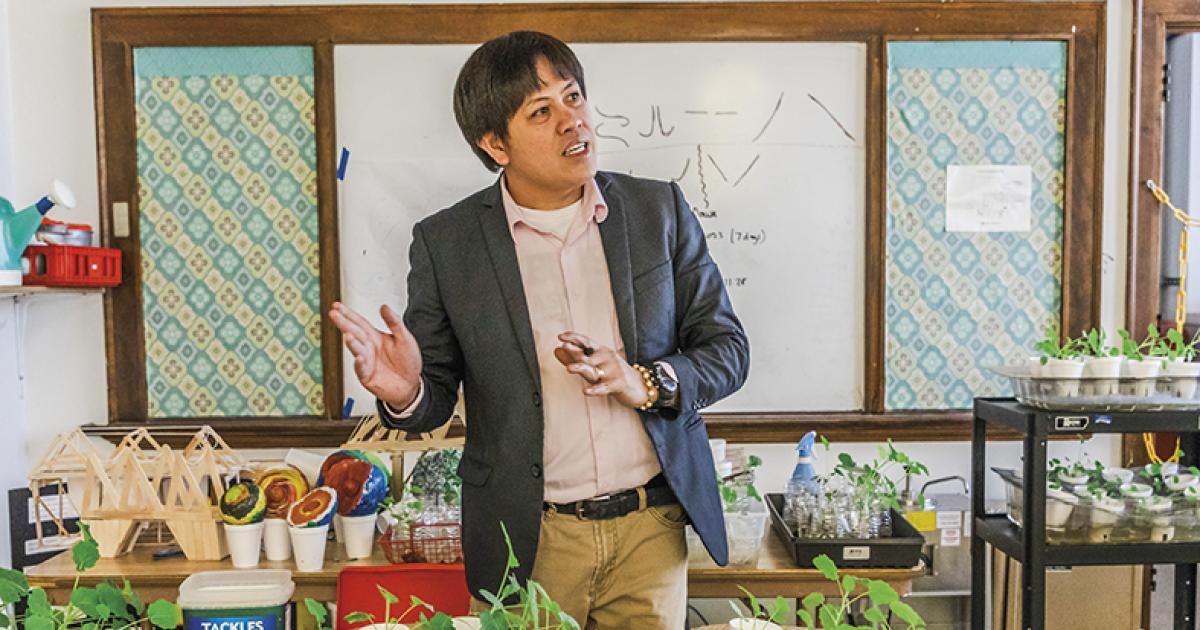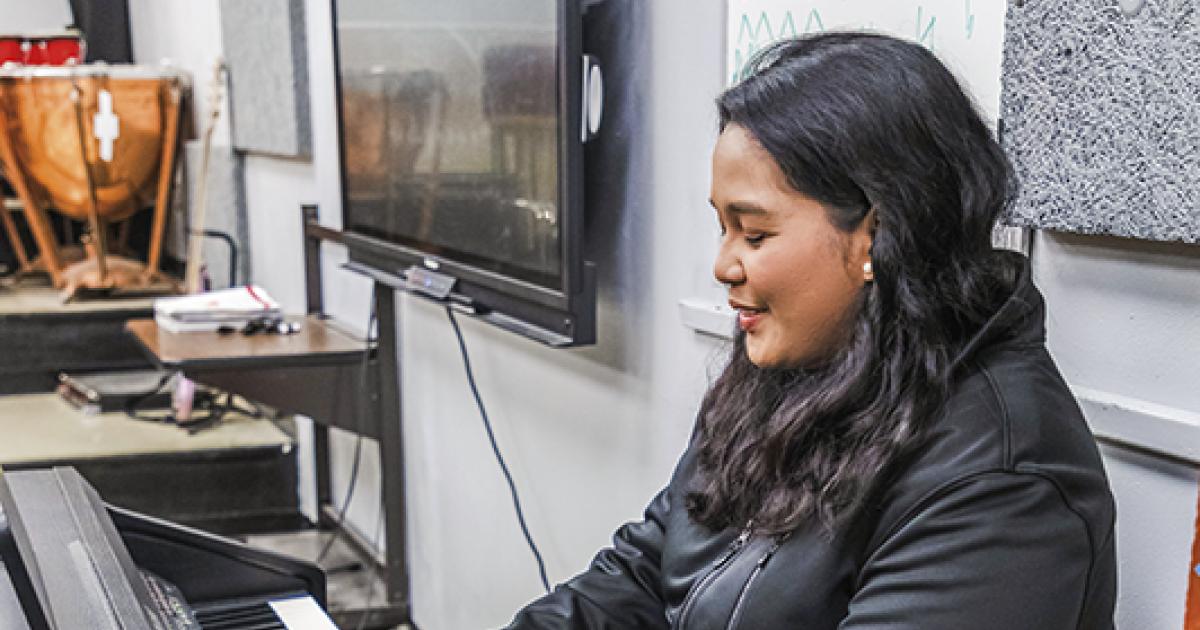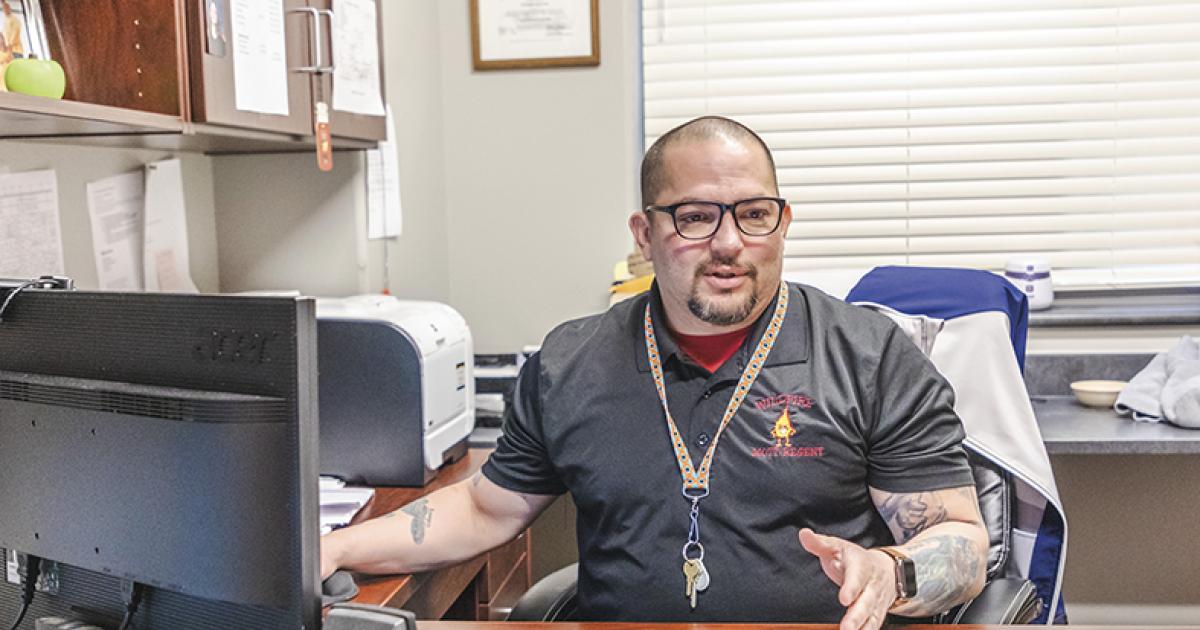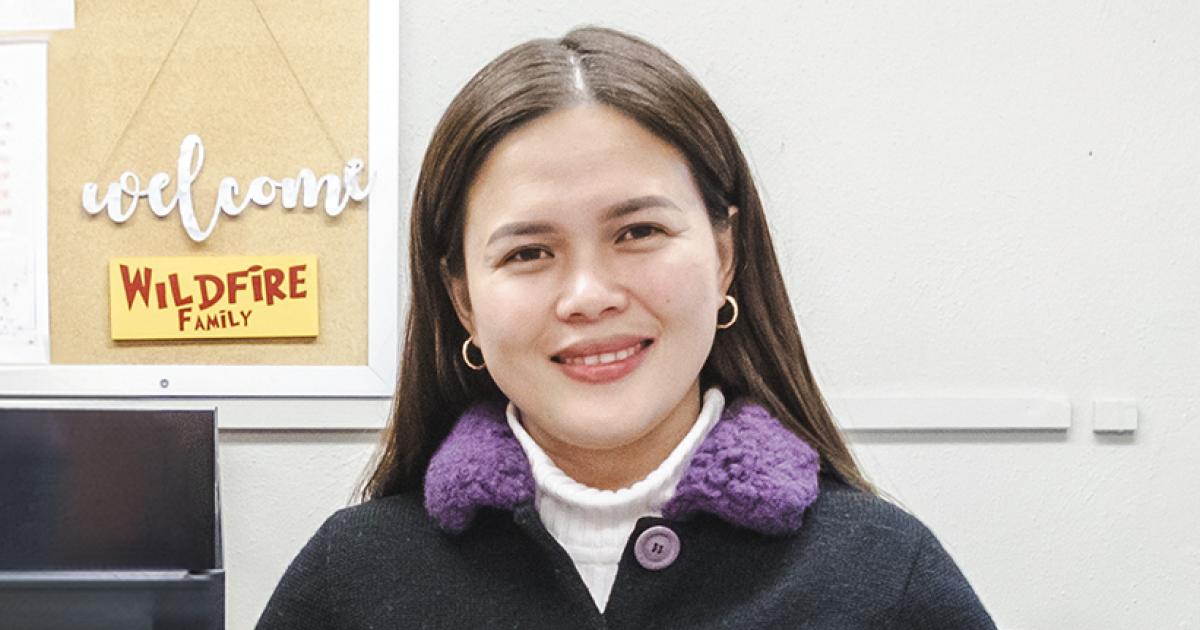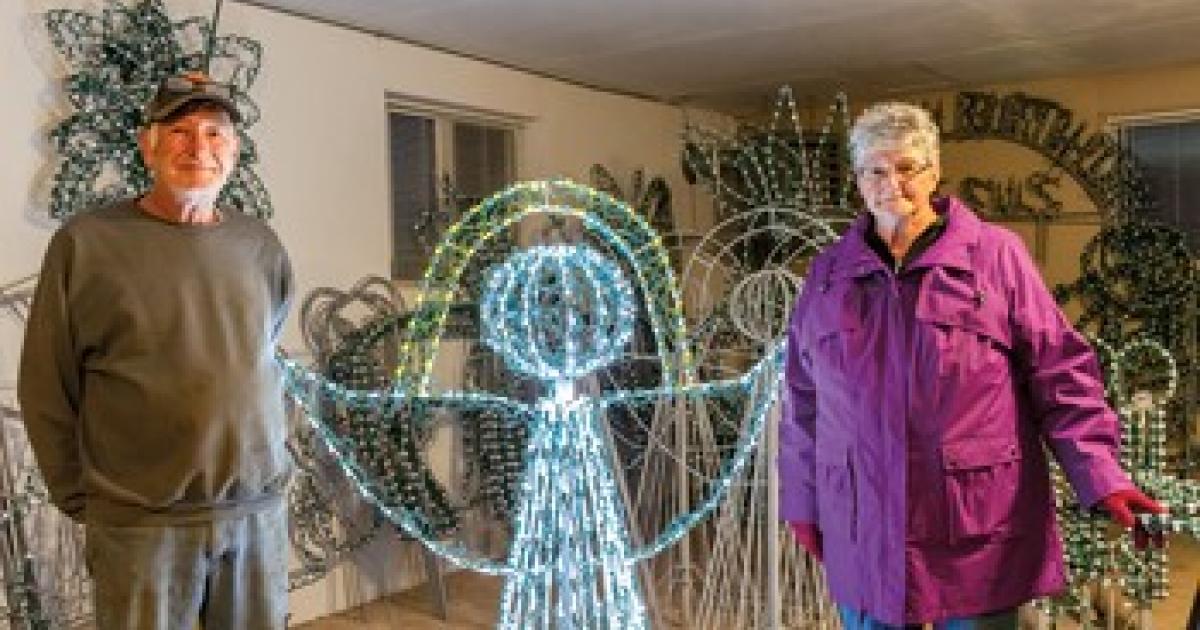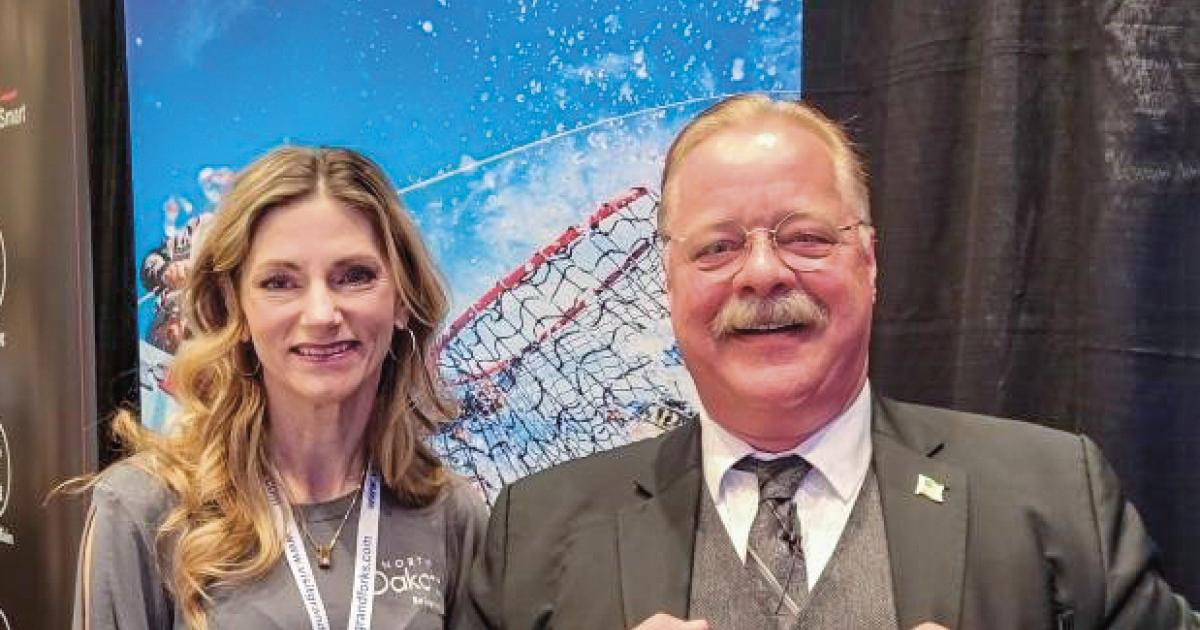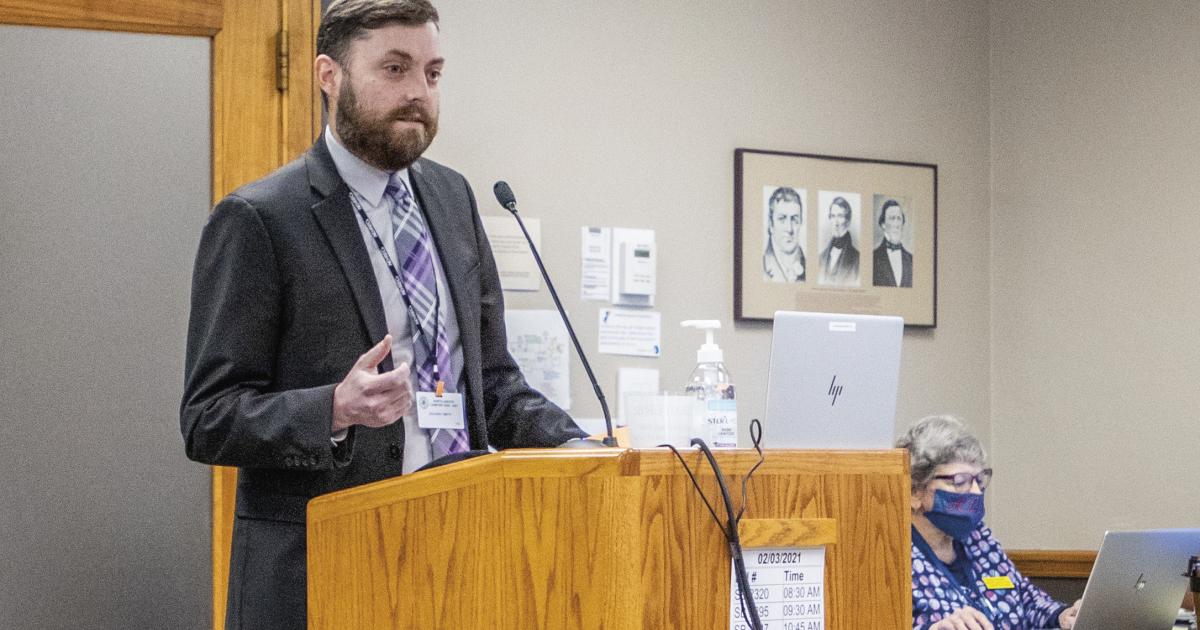Eamon Alido teaches secondary science at Mott-Regent High School, making the most of limited school resources to create a hydroponics experiment with the students using repurposed supplies. Photos by NDAREC/Liza Kessel
Eamon Alido lifts the canola plants from a tray, enthusiastically explaining hydroponics as a technique of growing plants using a water-based nutrient solution rather than soil.
In the music room, Mikaela Fattorini ripples her fingers over the piano keys, then settles into singing “Let It Be” to the heavens.
While Alido and Fattorini ventured from a world away to teach in the rural community of Mott, science and music know no boundaries.
They are among six Filipino teachers in the Mott-Regent School District who are separating cultural differences one science experiment, math equation and musical note at a time.
“It is not the student who will adjust because we are new. It is we that adjust, because that is one of the principles of a good teacher. The teacher should be the one to adjust,” Alido says about any cultural differences.
“It’s our differences that make us all stronger,” he says.
Way outside the box
With a pervasive teacher shortage across North Dakota, school districts are carving out innovative solutions to ensure all students have high-quality teachers, and the Mott-Regent School District is no exception.
With approximately 230 K-12 students, the district had eight openings to fill to start the 2023-24 school year.
And filling those positions was a challenge.
“The fact of the matter is people are not going into education. We’re going to have to find another way as a profession to get people trained and certified to teach or you’re going to continue to see this trend,” Superintendent Zachary Slayton says.
Data gathered by the N.D. Department of Public Instruction was presented at the N.D. Legislature’s interim Higher Education Committee Oct. 11, 2023, and identified five “critical need” teaching positions in the state. Top on the list is K-12 special education teachers, followed by career and technical education teachers, fine and performing arts teachers, counselors and high school science teachers. Among those top five critical need areas, 129 positions were unfilled when the survey was completed.
To fill its eight positions, the Mott-Regent School District advertised across North Dakota, then nationally, then globally. It received zero applicants for its math or special education positions from within the United States.
Eventually, the district hired two North Dakotans and six Filipino teachers. Even though there was a lack of U.S. applicants, the district didn’t sacrifice quality. And opening the doors to international applications gave the district some choices.
“We weren’t going to hire someone just to put a body in the seat,” Slayton says. “That never works.”
Instead, the rural school district filled positions with experienced teachers, many holding master’s degrees.
“We had a pool of teachers to choose from with various visa sponsors from all over the world, but when it came down to interviewing, the Filipino teachers we selected were by far and away the best we had available to us,” Slayton says.
“I believe in the philosophy of good to great,” Slayton says, based on a book by the same name. “That’s what the students deserve.”
“They all are awesome teachers,” he says. “I really had a good feeling that all the teachers we hired have greatness in them, and they have proven that to us through semester one.”
The district vetted every applicant, from India, South Africa and the Philippines, interviewing as a team and requiring the candidates to share a virtual lesson to demonstrate their teaching capabilities.
“You want to make sure the English is good enough that it’s not going to pose problems for the children,” Slayton adds.
“I think some communities aren’t open to it and I think they’re making a mistake,” he says. “I want the best and if I have to go get somebody from another state or if we have to get somebody through legal immigration channels to fill these positions, I would do it every time. I would hire local if that’s the best candidate. I want the best and that’s what we got.”
Penciling the numbers
Districts typically find international teaching staff through agencies, which serve as a liaison between the district and applicants. All six of the Mott-Regent School District’s teachers from the Philippines arrived with a J-1 visa, which allows them to stay in the United States for three to five years.
About 300,000 J-1 visas were issued nationally in 2023. Data from 2022-23 shows North Dakota received 66 teachers on J-1 visas, which ranked North Dakota 19th overall. North Carolina ranked first with 923. Of the total, 2,166 were from the Philippines, with Jamaica second at 825. J-1 is not necessarily the only visa type available for educators, but some school districts have reported not being able to recruit J-1 visa teachers due to a cap being reached.
“The next battle for us is trying to find out how we can increase our state’s portion (of J-1 visas), so other schools can partake in this,” says Board Chairman Lucas Greff.
A limited number of graduating teachers are being soaked up by urban districts, he points out.
“What can a rural school do?” Greff says. “What do we have to do as a state to make this opportunity available to all rural schools? How do we as a state ensure that the priority of J-1 staff goes to rural school districts?”
One-quarter of Mott-Regent School District’s teaching staff are international teachers, he says.
“Our office and our partners in other states are working with several national firms that have the ability to advocate more directly to increase the caps on several visa types and to take steps to reduce the processing times and transparency of information in general. … I’m happy to share our delegation has been supportive of bills that include reform and improvements to the existing immigration systems, including increases to caps,” says Janna Pastir, deputy director of the N.D. Office of Legal Immigration.
Teachers at the Mott-Regent School District include:
• Kindergarten teacher Parah Apostol, who holds a master’s degree, is in her 13th year of teaching.
• Jezreel Mulit teaches first grade, coming from the Philippines with 10 years of experience.
• A husband-and-wife team teaches at the high school level. Ailen Alido, who holds a master’s degree in special education, is teaching secondary special education in her ninth year of teaching, while Eamon Alido teaches secondary science, with 17 years of experience and a master’s degree. Eamon was a secondary principal in the Philippines for six years, and earned the Dangal ng Bayan Award or the Outstanding Public Official and Employees Award, which is one of the highest awards a government employee or official can receive in the Philippines for extraordinary act, public service or exemplary ethical behavior in a region.
• Christian Culpable, who holds a master’s degree and has been teaching since 2016, is teaching 7-12 math.
• Mikaela Fattorini is the K-12 music teacher with a degree in music and art education. She taught the previous year at the Elgin-New Leipzig School District.
“They think outside the box. They are used to dealing with limited resources,” Greff says. “As such, they come up with a lot of very innovative ways to teach.”
“And they bring a lot of cultural diversity, which is good to expose the students to,” he says.
“That’s what my great-grandpa came here for. He came here to work and have a better life. Maybe this is the next generation of it,” Greff says.
Unique welcome
Slayton is uniquely suited to welcome the Filipino staff.
Originally from Shreveport, La., Slayton also taught and worked abroad, including in Korea, Kuwait and the Philippines. His wife, Joanna, is originally from the Philippines and is a paraprofessional at the school.
Slayton encourages the Filipino teachers to immerse themselves in the community, from learning how to make fleischkuekle to meeting community members.
“Building that social network and that safety net for them has alleviated so many issues,” Slayton says. “We set them up for success.”
Housing was an issue when Slayton moved to Mott himself, so he knew the challenge.
The district has since purchased an eight-unit apartment building to rent to any teachers or staff. So, when they arrived, the Alidos found their apartment completely furnished, from furniture to the kitchen utensils.
“It gives us more trust that we are secure,” Eamon says.
Experience to treasure
A Filipino teacher earns about $5,000 a year. But that’s just one reason they seek jobs in the United States.
As a special education teacher, Ailen wanted to explore the structure of the American Individualized Education Program (IEP).
“I need to go further, I need to grow professionally. So, I need to go where the IEP students are being given importance. I need to learn their educational system. Then, I need to go back to share my knowledge, especially in IEP, because they didn’t give importance to it. I feel all the students here are being given importance,” she says.
Already at the pinnacle of his career in the Philippines, Eamon was willing to start a new life venture to support his wife.
Then during Ailen’s interview, they learned Mott-Regent also needed a science teacher.
“It will be an opportunity for me to learn more about sciences and learning resources in the United States, and I can share the knowledge I have learned in my country to transform innovations that we need,” he says.
At their school in the Philippines, Eamon supervised 295 teachers and 6,167 students as a principal.
Eamon comes from generations of teachers, with memories of accompanying his mother to smaller villages to teach students how to read and write.
Ailen was raised by her oldest sibling after her father’s death and mother’s abandonment, and she knows the hardships of being poor.
“Having slept with an empty stomach, you can still become successful,” she says.
“This is my dream to become a teacher. I want to make a difference to my students. I am the only one who is in my family who is a professional. I am the only one to pursue college and have a degree in teaching,” Ailen says. “So, I needed to strive harder for me to get this dream of mine to become a teacher and to make the difference to each, especially to the less fortunate like me.”
Despite her fortitude, stepping into a foreign classroom had challenges.
“Despite my nine years of teaching experience, it feels like I’m starting anew, especially with the language barrier,” she says. “My patience is being tested. … There were moments when I questioned if I was fit for this. Times when I wanted to pack up and go home, but I am so grateful for my support system.”
“But as of today, I think I am loving being a teacher here in America,” she says. “It’s truly an enriching experience for me. I see the beauty of being a teacher here, and I’ve grown to love my students and the unique challenges.”
“Intrinsically, I’m very happy, because this is America,” Eamon says. “I moved outside the box. … The experience can never be compared to any amount of money. This experience will be the best experience of our life. It will be one we treasure while we are here.”
Fattorini’s first dream was to be a performer, as she started voice lessons when she was 7 years old, following a passion for music.
But her vocal music teacher inspired her to teach.
Fattorini recalls a dream in which she was standing backstage behind red curtains, assisting students who were performing.
“I realized when I became a teacher that music starts in the classroom,” she says.
She decided to take the leap to the United States after being encouraged by friends who were already teaching here. Her 10-year-old daughter has joined her this year, too, and is attending fourth grade.
“It’s a lot of challenges,” she says. “I’m glad I’m included in a community that’s very welcoming.”
“You have to have that passion and you have to remind yourself about why you’re here,” she says. “For me, it’s my family and a once-in-a-lifetime experience to teach other culture. … It’s not easy, but it’s worth it.”
___
Luann Dart is a freelance writer and editor who lives in the Elgin area.
Resources: Schools interested in learning more about immigration-based recruitment opportunities can view a list of service providers and staffing agencies vetted by the N.D. Office of Legal Immigration at www.commerce.nd.gov/workforce/office-legal-immigration.


